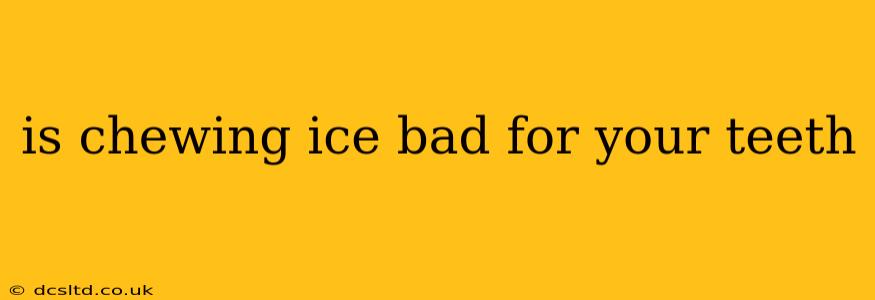Many people enjoy the refreshing sensation of chewing ice, especially on hot days. But is this seemingly harmless habit actually detrimental to your dental health? The short answer is: yes, chewing ice can be bad for your teeth. Let's delve deeper into the reasons why and explore the potential consequences.
Why is Chewing Ice Bad for Your Teeth?
The primary reason chewing ice is harmful is because it's incredibly hard. Your teeth, while strong, are not indestructible. The force exerted while crunching on ice can cause several problems:
-
Cracks and Chips: The most immediate risk is fracturing or chipping your teeth. Ice is significantly harder than your tooth enamel, leading to damage with repeated chewing. Even small chips can compromise the integrity of your teeth, making them more susceptible to cavities and further damage.
-
Weakened Enamel: Repeated exposure to the hard surface of ice can gradually wear down your tooth enamel, the protective outer layer. This weakening leaves your teeth more vulnerable to decay, sensitivity, and discoloration. Think of it like constantly scratching a surface – eventually, it will show wear and tear.
-
Increased Tooth Sensitivity: Once the enamel is compromised, the dentin (the layer beneath the enamel) becomes exposed. Dentin contains microscopic tubules that lead to the tooth's nerve, making your teeth extremely sensitive to hot and cold temperatures, as well as sweet and acidic foods.
-
Broken Fillings and Crowns: If you have existing dental work like fillings or crowns, the force of chewing ice can dislodge or crack them, necessitating further and potentially costly dental procedures.
What are the Long-Term Effects of Chewing Ice?
The cumulative effect of regularly chewing ice can significantly impact your oral health over time. Consistent damage to your teeth can lead to:
- Increased risk of cavities: Weakened enamel is more susceptible to bacterial attack, increasing the likelihood of developing cavities.
- Tooth pain and discomfort: Sensitivity and pain can become chronic, impacting your ability to enjoy eating and drinking.
- More extensive and costly dental work: Addressing chipped teeth, broken fillings, and potential root canals due to ice chewing can be expensive and time-consuming.
How Can I Stop Chewing Ice?
Breaking the habit of chewing ice can be challenging, but here are a few strategies:
-
Identify Triggers: Understand what situations or emotions lead you to chew ice. Are you bored, stressed, or simply enjoying the cold sensation? Identifying these triggers is the first step to managing the habit.
-
Find Alternatives: Seek out alternative ways to satisfy the craving for a cold sensation. Try ice-cold water, frozen fruit (like grapes or berries), or sugar-free popsicles.
-
Gradual Reduction: Instead of abruptly stopping, try gradually reducing your ice-chewing frequency. Set realistic goals, perhaps limiting yourself to only one small piece of ice per day.
-
Mindfulness: Pay attention to your chewing habits. Become more conscious of when you’re putting ice in your mouth. This increased awareness can help you break the cycle.
Is Chewing Ice Ever Okay?
While generally discouraged, there might be very rare exceptions. Occasionally chewing a small piece of ice may not cause significant damage, especially if your enamel is strong and you don’t do it frequently. However, the potential risks far outweigh any perceived benefits.
Can I repair damage from chewing ice?
Yes, damage from chewing ice can often be repaired by a dentist. Depending on the extent of the damage, this might involve filling a chip, bonding a cracked tooth, or even more extensive procedures such as crowns or root canals. It's important to seek professional dental care if you notice any damage to your teeth.
How often is chewing ice too much?
There's no magic number, but any regular chewing of ice is considered excessive and potentially damaging. Occasional instances might not cause harm, but making it a habit increases the risk of damage significantly. Listen to your teeth; if it hurts, stop.
In conclusion, while the refreshing sensation of chewing ice might be tempting, the potential for long-term damage to your teeth is substantial. It’s best to avoid this habit altogether and find healthier alternatives to satisfy your need for a cold treat. Remember to consult with your dentist if you're concerned about your teeth or have experienced any damage.
